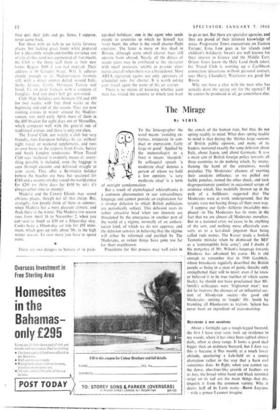The Mirage
By STRIX
To the lexicographer the word means 'avoiding ex- tremes, temperate in con- duct or expression; fairly large or good.' Applied by the meteorologist to a frost it means `sharpish.' In colloquial speech 'a moderate chap' denotes a person of whom we hold a low opinion; 'a very But a touch of etymological schizophrenia is a common phenomenon in our extraordinary language and cannot provide an explanation for a strange delusion to which British politicians are periodically subject. This delusion rears its rather attractive head when our interests are threatened by the emergence in another part of the world of a regime, normally of an authori- tarian kind, of which we do not approve; and the delusion consists in believing that the regime will either be reformed and purified by The Moderates, or (when things have gone too far for that) overthrown.
Precedents for this process may well exist in
the annals of the human race, but they do not spring readily to mind. What does spring readily to mind is that during the 'thirties large sections of British public opinion, and many of its leaders, nurtured exactly the same delusion about Italy, about Japan, and about Germany. It was a main aim of British foreign policy towards all three countries to do nothing which, by streng- thening the hand of the extremists, would prejudice The Moderates' chances of exerting their anodyne influence; so we pulled our feeble punches, turned the other cheek, and took disproportionate comfort in occasional scraps of evidence which, like molehills thrown up in the path of a bulldozer, suggested that The Moderates were at work underground, that the tyrants were not having things all their own way.
I suppose our faith—hitherto invariably mis- placed—in The Moderates has its roots in the fact that we are almost all Moderates ourselves. But in a national crisis we-cease to be anything of the sort, and nothing more effectively con- verts us to a last-ditch jingoism than being called rude names. The Kaiser made a foolish Teutonic mistake when he dismissed the REF as a 'contemptible little army'; and I doubt if the pungency of Mr. Wilson's language towards Rhodesia has advanced his cause. He is old enough to remember that in 1940 Goebbels, whose broadcasts regularly described the British people as being in a state of panic, thereby only strengthened their will to resist; even if he knew or believed it to be true (neither of which seems likely), he should not have proclaimed that Mr. Smith's colleagues were 'frightened men'; nor did he improve the chances of an influential sec- tion of Rhodesian society—the good old Moderates—uniting to 'topple' Mr. Smith by branding all Rhodesians as traitors. Spleen has never been an ingredient of statesmanship.






























 Previous page
Previous page